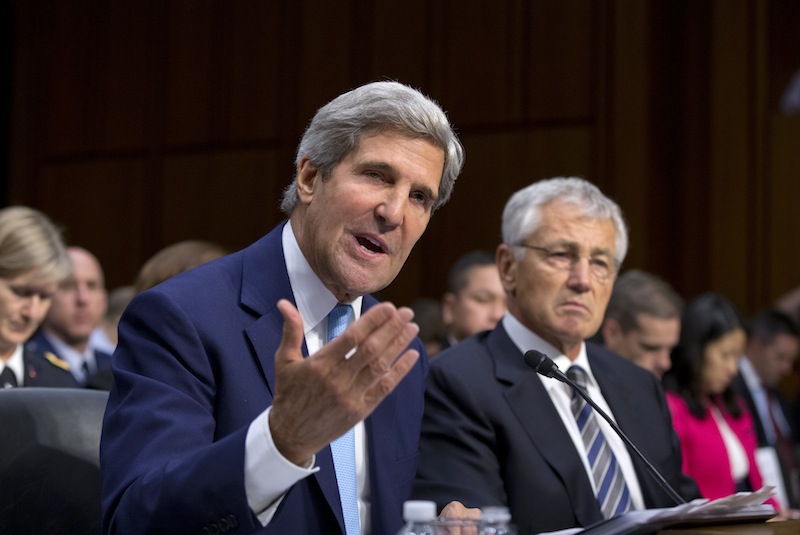After the first Capitol Hill test of the White House’s push for military action in Syria, one theme emerged Tuesday from Congress: Keep American ground troops out of Syria. If President Obama is to secure passage of the authorization that he is so publicly advocating for, he’ll have to assuage very persistent concerns from the Capitol that they aren’t going to be voting to entangle the United States into another quagmire in the Middle East.
It’s already been a central part of the pitch from President Obama and Secretary of State John Kerry, but it’s still one of the most common questions that members of Congress are posing to the Obama administration, along with what the fallout of a military strike would be.
Aides for both Democrats and Republicans, in both the House and the Senate, told TPM that keeping boots off the ground is either the primary or one of the primary concerns for members in deciding how to vote.
It makes sense politically. One Senate Democratic aide pointed to last week’s NBC News poll. When asked broadly if they supported military action in Syria, 50 percent of Americans opposed and 42 percent supported. But when told that military action would be limited to missile strikes launched from naval ships, the numbers flipped: 50 percent supported, and 44 percent opposed.
“You see a real shift in support when people were told about the scope of activity,” the aide said.
The Syria situation escalated while Congress members were on recess, and some have even spent their last week of recess holding town halls on the issue. Their last interactions with constituents, and the preoccupation with boots on the ground, will likely linger as they return to Washington.
“That’s probably what most people get asked about when talking to constituents,” a House Democratic aide told TPM.
With the ghosts of Iraq and Afghanistan ever present in public comments on Syria, the effort to avoid voting for action that will entrap the United States in another prolonged military action in the Middle East rings true. During Tuesday’s three-and-a-half hour Senate Foreign Relations Committee hearing on Syria, almost every committee member questioned Kerry, Defense Secretary Chuck Hagel, and Chairman of the Joint Chiefs of Staff Martin Dempsey about whether the White House would agree to language that restricted the use of ground troops in Syria.
As a starting point, several senators chastised the administration for its own proposed resolution, released over the weekend, which they said was too broad.
“It’s a very open-ended proposal. Why was it proposed in a way that conflicts with statements of no ground troops?” Sen. Tom Udall (D-NM) asked Kerry. “What precise language are you willing to back in terms of showing the American people that we really mean what we say in terms of no boots on the ground?”
“I take it very seriously that the language be as precise as possible,” Senate Majority Whip Dick Durbin (D-IL) told the White House’s representatives.
Though Obama had repeatedly said that there would be no “boots on the ground” in his earlier statements, Kerry opened that issue up for debate again with a decidedly fumbling response to a similar question from Sen. Bob Menendez (D-NJ) at the beginning of the hearing.
“In the event Syria imploded, for instance or in the event there was a threat of a chemical weapons cache falling into the hands of somebody else and it was clearly in the interest of our allies — all of us, the British, the French, and others. I don’t want to take off the table an option that might or might not be available to the President of the United States to secure our country,” Kerry said.
It wasn’t a very popular line with the committee. Ranking member Bob Corker (R-TN), whose staff has been involved with Menendez’s in drafting revised language for the resolution, said: “I didn’t find that a very appropriate response.” Kerry spent the rest of the hearing trying to walk it back.
“Let me be very clear now, because I do not want anything coming out of the hearing that leaves any door open to any possibility,” Kerry later said. “Let’s shut the door now as tight as we can. All I did was raise a hypothetical question about some possibility, and I am thinking out loud on how to protect America’s interests, but if you want to know if there is any — the answer is what ever prohibition clarifies it to Congress, there will not be American boots on the ground with respect to the civil war.”
The new resolution being drafted by the Corker and Menendez staffs will include language restricting the possibility of U.S. troops setting foot in Syria. Another alternative released Tuesday by two House Democrats, Chris Van Hollen (MD) and Gerald Connolly (VA), has a legally binding stipulation that no grounds troops be deployed, according to the Washington Post.
Corker said earlier Tuesday that he was “in agreement” with Menendez and Obama on what a new resolution should look like and indicated it could be released as early as Tuesday night. Menendez said at the end of Tuesday’s hearing that the committee would likely hold a business meeting Wednesday after a classified hearing on Syria.
The White House, for its part, has said it’s open to revising the resolution’s language. Kerry reaffirmed that position, specifically revisions barring the use of ground troops, in Tuesday’s hearing.
“We have zero problem in including some kind of prohibition there if that makes you comfortable,” he told the committee.









